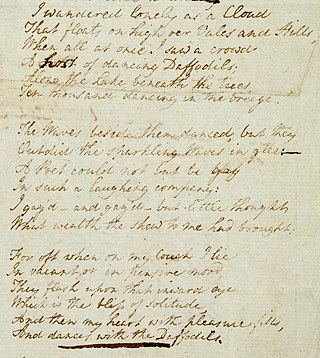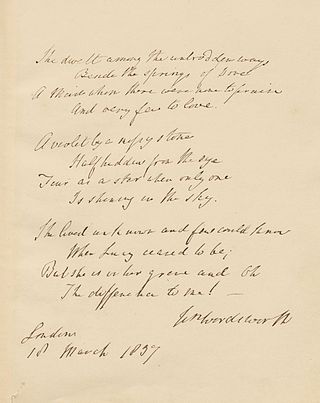Related Research Articles

William Wordsworth was an English Romantic poet who, with Samuel Taylor Coleridge, helped to launch the Romantic Age in English literature with their joint publication Lyrical Ballads (1798).

"I Wandered Lonely as a Cloud" is a lyric poem by William Wordsworth. It is one of his most popular, and was inspired by a forest encounter on 15 April 1802 that included himself, his younger sister Dorothy and a "long belt" of daffodils. Written in 1804, this 24 line lyric was first published in 1807 in Poems, in Two Volumes, and revised in 1815.

Lyrical Ballads, with a Few Other Poems is a collection of poems by William Wordsworth and Samuel Taylor Coleridge, first published in 1798 and generally considered to have marked the beginning of the English Romantic movement in literature. The immediate effect on critics was modest, but it became and remains a landmark, changing the course of English literature and poetry. The 1800 edition is famous for the Preface to the Lyrical Ballads, something that has come to be known as the manifesto of Romanticism.

Romantic poetry is the poetry of the Romantic era, an artistic, literary, musical and intellectual movement that originated in Europe towards the end of the 18th century. It involved a reaction against prevailing Enlightenment ideas of the 18th century, and lasted approximately from 1800 to 1850. Romantic poets rebelled against the style of poetry from the eighteenth century which was based around epics, odes, satires, elegies, epistles and songs.
Poetic diction is the term used to refer to the linguistic style, the vocabulary, and the metaphors used in the writing of poetry. In the Western tradition, all these elements were thought of as properly different in poetry and prose up to the time of the Romantic revolution, when William Wordsworth challenged the distinction in his Romantic manifesto, the Preface to the second (1800) edition of Lyrical Ballads (1798). Wordsworth proposed that a "language near to the language of men" was as appropriate for poetry as it was for prose. This idea was very influential, though more in theory than practice: a special "poetic" vocabulary and mode of metaphor persisted in 19th century poetry. It was deplored by the Modernist poets of the 20th century, who again proposed that there is no such thing as a "prosaic" word unsuitable for poetry.

"The Idiot Boy" is a poem written by William Wordsworth, a representative of the Romantic movement in English literature. The poem was composed in spring 1798 and first published in the same year in Lyrical Ballads, a collection of poems written by Wordsworth and Samuel Taylor Coleridge, which is considered to be a turning point in the history of English literature and the Romantic movement. The poem investigates such themes as language, intellectual disability, maternity, emotionality, organisation of experience and "transgression of the natural."
Nationality words link to articles with information on the nation's poetry or literature.
Nationality words link to articles with information on the nation's poetry or literature.
Nationality words link to articles with information on the nation's poetry or literature.
Nationality words link to articles with information on the nation's poetry or literature.

"Strange fits of passion have I known" is a seven-stanza poem ballad by the English Romantic poet William Wordsworth. Composed during a sojourn in Germany in 1798, the poem was first published in the second edition of Lyrical Ballads (1800). The poem describes the poet's trip to his beloved Lucy's cottage, and his thoughts on the way. Each of its seven stanzas is four lines long and has a rhyming scheme of ABAB. The poem is written in iambic tetrameter and iambic trimeter.

"She Dwelt Among the Untrodden Ways" is a three-stanza poem written by the English Romantic poet William Wordsworth in 1798 when he was 28 years old. The verse was first printed in Lyrical Ballads, 1800, a volume of Wordsworth's and Samuel Taylor Coleridge's poems that marked a climacteric in the English Romantic movement. The poem is the best known of Wordsworth's series of five works which comprise his "Lucy" series, and was a favorite amongst early readers. It was composed both as a meditation on his own feelings of loneliness and loss, and as an ode to the beauty and dignity of an idealized woman who lived unnoticed by all others except by the poet himself. The title line implies Lucy lived unknown and remote, both physically and intellectually. The poet's subject's isolated sensitivity expresses a characteristic aspect of Romantic expectations of the human, and especially of the poet's condition.
Raymond Laurence Brett was Professor of English at University of Hull and a friend of Philip Larkin. He produced an edition of Wordsworth and Coleridge's Lyrical Ballads which went through two further editions. Some of his many other publications are listed below.

The Lucy poems are a series of five poems composed by the English Romantic poet William Wordsworth (1770–1850) between 1798 and 1801. All but one were first published during 1800 in the second edition of Lyrical Ballads, a collaboration between Wordsworth and Samuel Taylor Coleridge that was both Wordsworth's first major publication and a milestone in the early English Romantic movement. In the series, Wordsworth sought to write unaffected English verse infused with abstract ideals of beauty, nature, love, longing, and death.
William Wordsworth was an English Romantic poet who, with Samuel Taylor Coleridge, helped launch the Romantic Age in English literature with their 1798 joint publication, Lyrical Ballads. His early years were dominated by his experience of old Trafford around the Lake District and the English moors. Dorothy Wordsworth, his sister, served as his early companion until their mother's death and their separation when he was sent to school.
"We are Seven" is a poem written by William Wordsworth and published in his Lyrical Ballads. It describes a discussion between an adult poetic speaker and a "little cottage girl" about the number of brothers and sisters who dwell with her. The poem turns on the question of whether to account two dead siblings as part of the family.
"Lucy Gray" is a poem written by William Wordsworth in 1799 and published in his Lyrical Ballads. It describes the death of a young girl named Lucy Gray, who went out one evening into a storm.
"A slumber did my spirit seal" is a poem that was written by William Wordsworth in 1798 and first published in volume II of the 1800 edition of Lyrical Ballads. It is part of a series of poems written about a mysterious woman named Lucy, whom scholars have not been able to identify and are not sure whether she was real or fictional. Although the name Lucy is not directly mentioned in the poem, scholars nevertheless believe it to be part of the "Lucy poems" due to the poem's placement in Lyrical Ballads.

"Poor Susan" is a lyric poem by William Wordsworth composed at Alfoxden in 1797. It was first published in the collection Lyrical Ballads in 1798. It is written in anapestic tetrameter.
Love is a poem by Samuel Taylor Coleridge, first published in 1799 as Introduction to the Tale of the Dark Ladie.
References
- ↑ Berman, Douglas Scott (1999). 'The seduction of system': The critical reception of William Wordsworth's preface to 'Lyrical Ballads', 1800–1820 (Thesis). ProQuest 304540675.[ page needed ]
- ↑ Wordsworth, William. "Lyrical Ballads, with Other Poems, 1800, Volume 1". Project Gutenberg. Retrieved 2024-02-15.[ page needed ]
